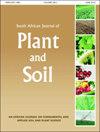Aluminium and manganese leaching and retention in two contrasting soils treated with aluminium-based sludge water in a column experiment
IF 1.1
Q3 AGRONOMY
引用次数: 1
Abstract
Liquid waste (sludge water (SW)) from treatment of drinking water contains impurities which pose disposal challenges. Irrigation with SW could be a solution for the Morton Jaffray Water Works. This study was conducted to determine the effects of SW dilution on aluminium (Al) and manganese (Mn) concentrations in (a) leachates from columns with either clay or a sandy loam soil and (b) different depths in the columns. The columns were leached with tap water (control) and 25, 50, 75 and 100% of the original SW concentration and the leachates were analysed for pH, electrical conductivity (EC), Al, and Mn. The sectioned soils (0–5, 5–10, 10–15 cm depths) were analysed for pH, exchangeable acidity, extractable Mn and total Al and Mn. Leaching with undiluted SW significantly increased EC and Al and Mn concentrations and lowered pH in leachates of the first four and two leaching events in the clay and sandy loam soils, respectively. The last two to four leaching events released additional Mn. Higher SW concentrations significantly increased retention of Mn, Al, extractable Mn and acidity, and lowered pH in the soils. In practice, irrigation with SW may retain the pollutants and acidify the soil, increasing Mn mobility, potentially causing leaching and phytotoxicity.铝基污泥水处理两种对比土壤中铝和锰的柱状浸出和滞留
饮用水处理产生的液体废物(污泥水(SW))含有杂质,这给处理带来了挑战。SW灌溉可能是Morton Jaffray水利工程的一个解决方案。本研究旨在确定SW稀释对铝(Al)和锰(Mn)浓度的影响,(a)来自粘土或沙壤土柱的浸出液,以及(b)柱中不同深度。用自来水(对照)和25%、50%、75%和100%的原始SW浓度浸出柱,并对浸出液的pH、电导率(EC)、Al和Mn进行分析 cm深度)的pH值、可交换酸度、可提取Mn以及总Al和Mn进行了分析。在粘土和沙壤土的前四次和两次浸出过程中,用未稀释的SW浸出分别显著增加了EC、Al和Mn的浓度,并降低了浸出液的pH值。最后两到四次浸出事件释放了额外的Mn。较高的SW浓度显著增加了Mn、Al、可提取Mn和酸度的保留,并降低了土壤中的pH值。在实践中,SW灌溉可能会保留污染物并使土壤酸化,增加Mn的迁移率,可能导致浸出和植物毒性。
本文章由计算机程序翻译,如有差异,请以英文原文为准。
求助全文
约1分钟内获得全文
求助全文
来源期刊

South African Journal of Plant and Soil
Agricultural and Biological Sciences-Plant Science
CiteScore
1.90
自引率
11.10%
发文量
32
期刊介绍:
The Journal has a proud history of publishing quality papers in the fields of applied plant and soil sciences and has, since its inception, recorded a vast body of scientific information with particular reference to South Africa.
 求助内容:
求助内容: 应助结果提醒方式:
应助结果提醒方式:


